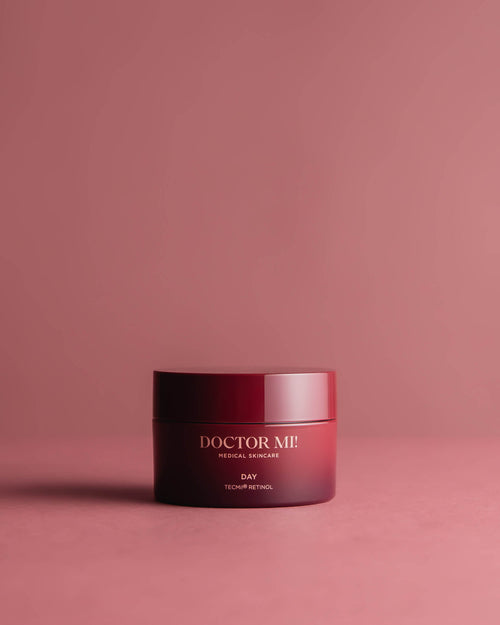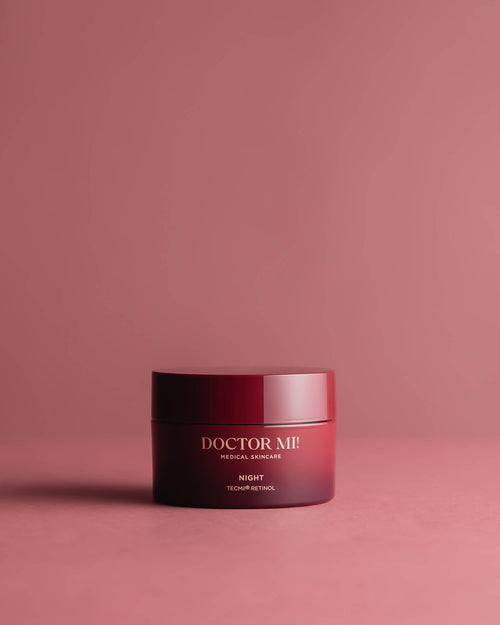Retinol: The power active ingredient for a fresh, healthy, and regenerated complexion
When it comes to skincare and anti-aging, we are increasingly hearing about the powerful active ingredient retinol. No wonder – its cell-renewing effect is scientifically proven. Nevertheless, a number of myths surround this special ingredient. One thing is clear: retinol has been known for much longer than one might think, as Paul Karrer received a Nobel Prize in 1937 for his research on vitamin A and its effects on the body. You will now learn about the positive effects this ingredient can have on your skin, what to look for when buying a retinol skincare product, and how to properly use this superhero.

Retinol & its effect on the skin
As you have just learned, retinol has not only been known since yesterday. Nevertheless, it is only now becoming increasingly popular. Vitamin A is essential for our body – our health, metabolism, and eyes benefit from this vitamin. However, in facial care, a variety of positive effects can be observed. For this reason, we would first like to provide you with a comprehensive overview of this wonderful ingredient.
To understand how retinol works, it is first important to understand how our skin is composed. Our skin consists of many thin layers. The outermost layer, the epidermis, is called the epidermis. It ensures that no germs and bacteria enter the body. For this reason, it is very important to regularly care for the skin and provide it with all necessary nutrients to ensure its optimal function. The underlying dermis, also called the dermis, provides elasticity and firmness to the skin with its denser connective tissue. This layer also contains muscle fibers, sebaceous glands, hair roots, and tactile sensory cells. The lowest skin layer is called the subcutis and serves, as the name subcutaneous fat tissue already suggests, to store heat and nutrients.
On average, your skin regenerates in about 28 days. However, regeneration and thus cell renewal decrease continuously with age. Furthermore, less collagen is produced, which keeps the skin firm and smooth. This combination makes the skin appear increasingly dull and saggy. But there is hope: Retinol is a true superhero in the anti-aging field! Various studies have demonstrated an extremely positive effect on skin structure. The vitamin supports regeneration, refines pores, and can reduce problematic skin. Retinol can also have a positive effect on acne. In addition, this antioxidant works wonders against free radicals.
This is how retinol works in the skin:
It promotes skin renewal, refines the skin texture, and stimulates collagen synthesis in the deeper layers of the skin.

Skin renewal

Refinement of the skin texture

Collagen synthesis
What exactly is Retinol & what should you pay attention to
Retinol has been considered the best anti-aging ingredient since the mid-20th century. Since our body cannot produce retinol – that is, vitamin A1 – on its own, we can only obtain it through food. Because this is rather difficult in higher doses, the ingredient became popular in cosmetics, i.e., through topical application, and is now regarded as the gold standard in the field of anti-aging. Retinol helps to significantly reduce wrinkles and prevent their formation, as well as rebuild the skin structure. It also acts as an antioxidant against free radicals. These are produced by the body itself during various metabolic processes but also arise from harmful external influences such as environmental toxins, UV or sunlight exposure, or cigarette smoke.
Vitamin A supports the formation of new cells and the skin's regeneration process, resulting in visibly smoother skin. Through the production of healthy skin cells and regulated cell function, retinol is also effective against acne. It reduces the skin's sebum production and actively counteracts the formation of pimples and oily skin exactly where they occur. This way, the cause is addressed rather than just the symptom.
Now you're probably thinking that you want to try this miracle cure as well. The following tips and tricks can help you use retinol correctly and avoid skin irritation.
-
How often should I use retinol?
The frequency with which retinol can be used depends on the exact retinol dosage. Low-dose retinol (0.1%-1%) can be used daily without any problems. High-dose retinol can be used up to five times a week in the evening if well tolerated. The important thing here is a controlled and gradual introduction to slowly accustom the skin to this active ingredient. -
How quickly does retinol work?
The effect of retinol begins immediately. The skin feels visibly smoother and firmer. However, a complete skin transformation as a result of treatment with retinol takes 6 to 12 weeks, depending on individual disposition. -
Is retinol harmful or dangerous?
Retinol has high efficacy and a low risk. When using the active ingredient, it should be started in low doses, and if well tolerated, the usage can be increased. Retinol makes the skin more sensitive to light, which is why the application of highly concentrated formulations (RED) is recommended in the evening. During the day, a daytime retinol (DAY) should be used. Here, the formulation is adjusted to boost the cell-renewing effect while simultaneously not making the skin more sensitive to light. Regardless of the use of retinol products, a sunscreen should always be applied to avoid pigmentation spots and wrinkle formation. Regarding use during pregnancy, a doctor should be consulted about the use of retinol.
These three forms of retinol exist
There are three types of retinol to distinguish between. First, the retinol precursors – these are called retinol esters, pure retinol, and tretinoin. Tretinoin is the active retinoic acid. When using retinol esters, this substance is converted into retinol in the skin, and from retinol, tretinoin is formed. Although these forms of retinol have existed for a long time, there is still confusion about the exact effects of the different retinol forms. But no worries! We have created a small overview of the three different forms.
1. Retinol Ester (INCI Retinyl Palmitate, Retinyl Linoleate, often mistakenly referred to as Retinol Palmitate or Linoleate)
Retinol precursors must be converted into retinol in the skin through chemical reactions. These substances are gentler on the skin because they are less potent and inactive forms of retinol. Retinol esters are a mild alternative for sensitive skin.
2. Pure Retinol (INCI Retinol)
Pure retinol is first converted in the skin into retinal and then into retinoic acid (tretinoin). The active form of retinol is therefore called tretinoin. Pure retinol is usually used at a maximum concentration of up to 1%. Caution: The higher the concentration, the stronger the effect. However, a gradual increase in dosage should be observed, as too high a concentration can lead to skin irritation.
3. Tretinoin, the active retinoic acid
This active retinoic acid is also called Vitamin A. Since the acid is very irritating when applied in its pure form, mixed forms are always used in cosmetics. Pure tretinoin is prescription-only and can only be found in pharmacy-sold medications, e.g., for acne, and has strong side effects.
Retinol & Sonne
As you have just learned, retinol stimulates collagen synthesis in the deeper layers of the skin, making the skin smoother, healthier, and stronger. At the same time, cell regeneration is strongly stimulated. The skin surface then consists of a layer of healthy, young skin cells, which are particularly sensitive. Due to the increased light sensitivity, we recommend always using an SPF 50+ for the face, regardless of retinol, in terms of anti-aging.

The correct dosage of retinol for optimal tolerability
To avoid stressing your skin too much, it is important to adhere to the correct dosage of retinol preparations. At the beginning, the cream or serum should be applied only in the evening about 1-2 times a week to observe the skin's reaction. If the skin reacts positively, the dosage can be gradually increased. If the tolerance is very good, a retinol preparation can be used up to 5 times a week.
Make your personal retinol experience – with DOCTOR Mi!
DOCTOR MI! medical skincare is your ultimate retinol care with high-end retinol of the highest quality. The retinol is extra highly dosed and at the same time particularly compatible – even for sensitive skin. The vitamin A1 (retinol) in our products is unusually gentle and effective because we double-encapsulate the contained molecules with TECMi!® deep technology, so we deliver the highly dosed retinol directly to where it rejuvenates the skin instead of irritating it. With the exclusive superheroes in the form of highly concentrated ingredients of the highest quality, you achieve a maximum anti-aging effect, skin rejuvenation, skin improvement, reduction of pimples and wrinkles, and an even complexion. Help your skin renew and rejuvenate itself with DOCTOR MI!.






